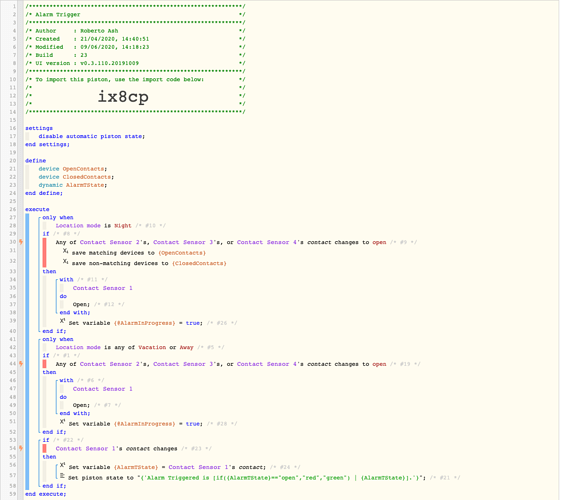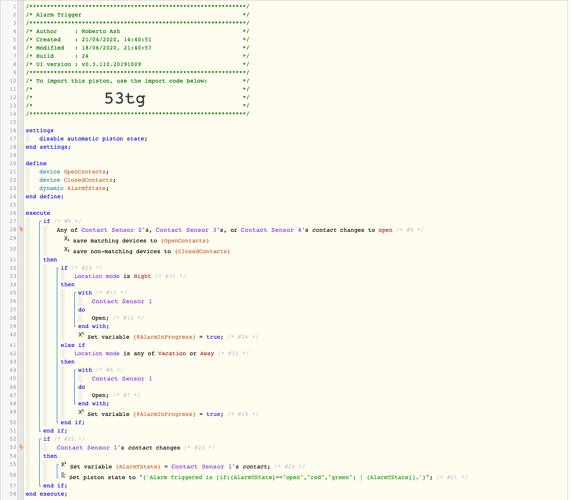1) Give a description of the problem
I have a virtual contact sensor called “Alarm Triggered” that should be opened when any door opens and the alarm is set to armed.
2) What is the expected behaviour?
Any of the three doors opening should open the virtual contact sensor when the alarm is armed.
3) What is happening/not happening?
Sometimes it all works fine and the alarm is triggered. But this morning, for example, I forgot to disarm the alarm and walked out the door. I closed the door without anything being tripped. So my girlfriend assumed the alarm was already unarmed and she tripped it when she opened another door about 6 minutes later.
Could it have something to do with me closing the door “too quickly”? For some reason Webcore shows only about 1/2 second between “door open” and “door closed” piston executions even though I know it took me around 10 second to leave since I was carrying stuff out. I am guessing the first execution lagged for some reason while the second one was done pretty much immediately. This makes reproducing the issue a bit difficult. In any case, if that is the reason, I can’t guarantee burglars will keep the door open long enough when they come in 

 so it’s something that I need to fix anyway.
so it’s something that I need to fix anyway.
I have read a lot about Task Cancellation Policies but it is most of the time related to a wait in an inner “with” block. But does it also work when a condition changes state during regular execution? And if so, where should it be placed if there is no wait?
4) Post a Green Snapshot of the piston![]()
5) Attach logs after turning logging level to Full
This is me opening the door and the alarm NOT being triggered (I have marked what seems suspicious to me in bold):
18/06/2020, 08:44:52 +534ms
+1ms ╔Received event [Main Door].contact = open with a delay of 75ms
+108ms ║RunTime Analysis CS > 15ms > PS > 31ms > PE > 62ms > CE
+111ms ║Runtime (43155 bytes) successfully initialized in 31ms (v0.3.110.20191009) (109ms)
+112ms ║╔Execution stage started
+120ms ║║Comparison (string) :00d9fccffd94105c2738f1609244e192: is (string) :00d9fccffd94105c2738f1609244e192: = true (1ms)
+122ms ║║Cancelling condition #10’s schedules…
+123ms ║║Condition #10 evaluated true (6ms)
+125ms ║║Cancelling condition #8’s schedules…
+126ms ║║Condition group #8 evaluated true (state changed) (8ms)
+138ms ║║Comparison (enum) open changes_to (string) open = false (1ms)
+144ms ║║Condition #9 evaluated false (17ms)
+145ms ║║Cancelling condition #8’s schedules…
+146ms ║║Condition group #8 evaluated false (state changed) (20ms)
+153ms ║║Comparison (string) :00d9fccffd94105c2738f1609244e192: is_any_of (string) :dfde6a6e2dfa518a0913959c04ab8ba8:,:2065d56276b3c07c95d21f09b242b343: = false (2ms)
+155ms ║║Condition #5 evaluated false (6ms)
+156ms ║║Condition group #1 evaluated false (state did not change) (7ms)
+164ms ║║Condition #23 evaluated false (4ms)
+165ms ║║Condition group #22 evaluated false (state did not change) (6ms)
+167ms ║╚Execution stage complete. (55ms)
+168ms ╚Event processed successfully (168ms)
This is me closing the door when I left:
18/06/2020, 08:45:28 +871ms
+1ms ╔Received event [Main Door].contact = closed with a delay of 71ms
+106ms ║RunTime Analysis CS > 18ms > PS > 37ms > PE > 52ms > CE
+109ms ║Runtime (43158 bytes) successfully initialized in 37ms (v0.3.110.20191009) (108ms)
+110ms ║╔Execution stage started
+117ms ║║Comparison (string) :00d9fccffd94105c2738f1609244e192: is (string) :00d9fccffd94105c2738f1609244e192: = true (1ms)
+118ms ║║Condition #10 evaluated true (4ms)
+119ms ║║Cancelling condition #8’s schedules…
+120ms ║║Condition group #8 evaluated true (state changed) (6ms)
+131ms ║║Comparison (enum) closed changes_to (string) open = false (1ms)
+136ms ║║Condition #9 evaluated false (15ms)
+137ms ║║Cancelling condition #8’s schedules…
+138ms ║║Condition group #8 evaluated false (state changed) (17ms)
+144ms ║║Comparison (string) :00d9fccffd94105c2738f1609244e192: is_any_of (string) :dfde6a6e2dfa518a0913959c04ab8ba8:,:2065d56276b3c07c95d21f09b242b343: = false (2ms)
+145ms ║║Condition #5 evaluated false (4ms)
+146ms ║║Condition group #1 evaluated false (state did not change) (6ms)
+153ms ║║Condition #23 evaluated false (4ms)
+154ms ║║Condition group #22 evaluated false (state did not change) (6ms)
+156ms ║╚Execution stage complete. (45ms)
+157ms ╚Event processed successfully (158ms)
This is my girlfriend opening the door and the alarm being tripped, as expected:
18/06/2020, 08:50:32 +72ms
+1ms ╔Received event [BR Door].contact = open with a delay of 105ms
+95ms ║RunTime Analysis CS > 14ms > PS > 30ms > PE > 51ms > CE
+97ms ║Runtime (43156 bytes) successfully initialized in 30ms (v0.3.110.20191009) (96ms)
+98ms ║╔Execution stage started
+105ms ║║Comparison (string) :00d9fccffd94105c2738f1609244e192: is (string) :00d9fccffd94105c2738f1609244e192: = true (1ms)
+107ms ║║Condition #10 evaluated true (4ms)
+108ms ║║Cancelling condition #8’s schedules…
+108ms ║║Condition group #8 evaluated true (state changed) (6ms)
+119ms ║║Comparison (enum) open changes_to (string) open = true (0ms)
+124ms ║║Cancelling condition #9’s schedules…
+125ms ║║Condition #9 evaluated true (16ms)
+126ms ║║Condition group #8 evaluated true (state did not change) (17ms)
+128ms ║║Cancelling statement #11’s schedules…
+161ms ║║Executed physical command [Alarm Triggered].open() (29ms)
+162ms ║║Executed [Alarm Triggered].open (31ms)
+164ms ║║Cancelling statement #25’s schedules…
+168ms ║║Executed virtual command setVariable (0ms)
+174ms ║║Comparison (string) :00d9fccffd94105c2738f1609244e192: is_any_of (string) :dfde6a6e2dfa518a0913959c04ab8ba8:,:2065d56276b3c07c95d21f09b242b343: = false (2ms)
+175ms ║║Condition #5 evaluated false (5ms)
+176ms ║║Condition group #1 evaluated false (state did not change) (6ms)
+183ms ║║Condition #23 evaluated false (3ms)
+184ms ║║Condition group #22 evaluated false (state did not change) (5ms)
+186ms ║╚Execution stage complete. (87ms)
+187ms ╚Event processed successfully (186ms)



